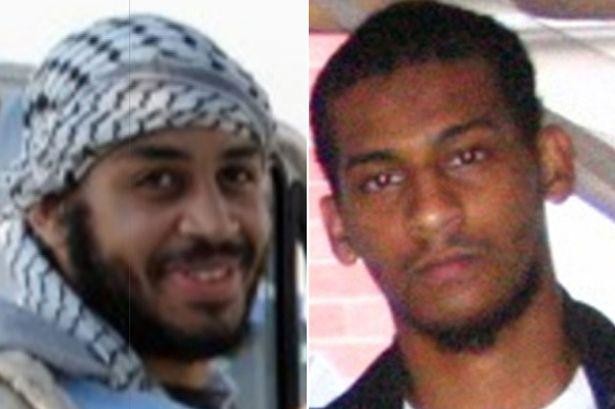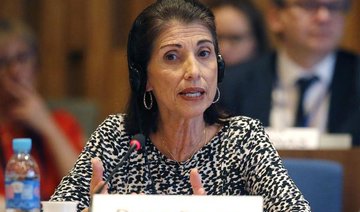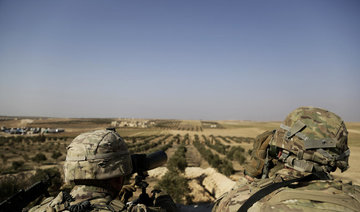LONDON: Daesh militant Alexanda Kotey, known for his part in a brutal murder squad, is thought to have been fleeing to Turkey when he was seized by US-backed Kurdish forces in northern Syria.
Kotey, 34, along with El Shafee Elsheikh, 29, was part of a notorious Daesh execution cell, known for participating in the brutal beheadings and torture of hostages, who knew them as the “Beatles” because of their British accents. “He was intending to escape toward Turkey with cooperation and coordination with friends of his on the Turkish side,” senior SDF official Redur Xelil told Reuters. “He is now under investigation with us,” he added. No information on Elsheikh was provided. A senior security official in Turkey described the claim as “nonsense.”
The pair were detained in January but American officials initially kept the news secret “to allow analysts more time to pursue the intelligence leads,” The New York Times said.
UK officials described the capture as a potential “treasure trove” of intelligence and are hoping to glean information on the whereabouts of John Cantlie, the British journalist captured by Daesh in 2012 alongside US journalist James Foley, who was beheaded in 2014.
Kotey and Elsheikh are already believed to have supplied valuable intelligence and could provide important insights on foreign fighters disbanded by the collapse of the so-called caliphate.
Tahir Abbas, a senior research fellow specializing in Islamophobia and radicalization at RUSI, a London-based think tank, told Arab News that their capture presented “vital and valuable opportunities” to gain greater insights into the workings of Daesh. “These individuals carry with them all sorts or knowledge and understanding of what went on inside” as well as “how people came from the UK and other European countries to Syrian and Iraq.”
Kotey, described by friends as a “quiet and humble” football fan of Ghanaian-Greek Cypriot origin, acted as a recruiter for Daesh and is believed to have encouraged several UK nationals to join the group. According to the US State Department, he “likely engaged in the group’s executions and exceptionally cruel torture methods, including electronic shock and waterboarding.”
Elsheikh also participated in the torture and had a reputation for “waterboarding, mock executions, and crucifixions” the US State Department said.
The cell’s frontman was Mohamed Emwazi, known as Jihadi John, who became notorious after appearing in Daesh propaganda videos depicting the execution of Western hostages, including Foley, UK aid workers David Haines and Alan Henning, US aid worker Abdul-Rahman Kassig and Japanese hostage Kenji Goto. He was killed in a US drone strike in 2015 following an extensive manhunt.
According to US officials the cell beheaded at least 27 Western hostages and was responsible for torturing many more. They were known for their brutality, frequently beating the hostages they held in Raqqa, who knew them by their Beatles names — Ringo, Paul, John and George.
A fourth member of the group Aine Davis is imprisoned in Turkey after being arrested near Istanbul in 2015. Like the others, Davis lived in West London, where they are believed to have met before traveling to Syria to join Daesh.
There is now speculation over whether the pair, who may have had their British citizenships revoked under powers available to the UK Home Office, will be repatriated to the UK or put on trial in the US. Their capture by US forces and alleged participation in the killing of US hostages could see some in the Trump administration push for them to be moved to Guantanamo Bay.
In his State of the Union address last month, Trump announced a decision to keep the controversial detention facility open: “I am asking Congress to ensure that in the fight against Isis and Al-Qaeda we continue to have all necessary power to detain terrorists wherever we chase them down, wherever we find them. And in many cases, for them, it will now be Guantanamo bay.”
Both UK MP Tobias Ellwood, whose brother was killed in a terrorist attack in Bali in 2002, and the mother of James Foley, have called for the pair to receive a fair trial. Diane Foley told the BBC: “I would like them to be brought to trial in the US but as long as they are brought to fair trial and detained and justice is served I would be most grateful.
“It does not bring James back but hopefully it protects others from this kind of crime.”
“I would like them to spend the rest of their lives being detained in a prison.”
Speaking on BBC Radio 4, Nicolas Henin, a former hostage who was held for 10 months, described the cell’s cruel treatment of captives. “I don’t like the word but yes, some of us have been tortured,” he said, adding that the men’s accents had clearly identified them as British.
“I will be extremely frustrated if they are not offered a fair trial, and I don’t think that the local authorities in northern Syria or that detention in Guantanamo would be justice,” he said. “I would like them brought back to Britain.”
All four members of the group are believed to have been radicalized in London. Kotey, a father of two who converted to Islam in his twenties, joined an aid convoy to Gaza in 2009 and never returned. Investigators believe he became radicalized while attending Al-Manaar mosque in Ladbroke Grove, alongside Emwazi.
“It’s right that they are returned to the UK and face justice accordingly,” Abbas, the research fellow at RUSI, said. “Yes they carried out undoubtedly heinous acts but they were, if their citizenship hasn’t been revoked, British citizens, who still have a claim to their Britishness on some level and we as a state should acknowledge that and process them through the justice system — that would be the right and fair thing to do and it would send the right signals.”
Elsheikh and his younger brother Mahmoud, who was killed while fighting for Daesh in Iraq, came from a family of Sudanese refugees. His mother Maha Elgizouli claimed her “perfect” son was influenced by the sermons of a radical West London Islamist cleric, Hani Al-Sibai, who once described the London bombings as a “great victory” for Al-Qaeda.
Egyptian-born Al-Sibai, 55, has been linked to numerous extremists, including Emwazi and Elsheikh, and is cited as an influence on the Tunisian terror group that trained Seifeddine Rezgui Yacoubi before he killed 38 tourists on a Tunisian beach in 2015.
Elgizouli said in an interview that she confronted the cleric and slapped him, saying “What have you done to my son?” After learning that Elsheikh was involved with the groups, she said: “That boy now is not my son. That is not the son I raised.”
Despite attempts by successive British governments to deport Al-Sibai he continues to live in West London.
The UK Home Office has faced similar problems with radical preachers in the past, notably Egyptian-born cleric Abu Hamza Al-Masri and Jordanian Abu Qatada, who was eventually deported to Jordan in 2014.
A report published in Oct. 2017 by The Soufan Center found that thousands of Daesh fighters had already returned to their home countries, including at least 425 to the UK — more than any other country in Europe.
How four British extremists went from West London to heading a brutal Daesh death cell
How four British extremists went from West London to heading a brutal Daesh death cell

Trump unveils investments to power AI boom

PITTSBURGH: US President Donald Trump went to Pennsylvania on Tuesday to announce $92 billion in energy and infrastructure deals intended to meet big tech’s soaring demand for electricity to fuel the AI boom.
Trump made the announcement at the inaugural Pennsylvania Energy and Innovation Summit at Carnegie Mellon University, with much of the talk about beating China in the global AI race.
“Today’s commitments are ensuring that the future is going to be designed, built and made right here in Pennsylvania and right here in Pittsburgh, and I have to say, right here in the United States of America,” Trump said at the event.
The tech world has fully embraced generative AI as the next wave of technology, but fears are growing that its massive electricity needs cannot be met by current infrastructure, particularly in the United States.
Generative AI requires enormous computing power, mainly to run the energy-hungry processors from Nvidia, the California-based company that has become the world’s most valuable company by market capitalization.
Officials expect that by 2028, tech companies will need as much as five gigawatts of power for AI — enough electricity to power roughly five million homes.
Top executives from Palantir, Anthropic, Exxon and Chevron attended the event.
The funding will cover new data centers, power generation, grid infrastructure, AI training, and apprenticeship programs.
Among investments, Google committed $25 billion to build AI-ready data centers in Pennsylvania and surrounding regions.
“We support President Trump’s clear and urgent direction that our nation invest in AI... so that America can continue to lead in AI,” said Ruth Porat, Google’s president and chief investment officer.
The search engine giant also announced a partnership with Brookfield Asset Management to modernize two hydropower facilities in Pennsylvania, representing 670 MW of capacity on the regional grid.
Investment group Blackstone pledged more than $25 billion to fund new data centers and energy infrastructure.
US Senator David McCormick, from Pennsylvania, said the investments “are of enormous consequence to Pennsylvania, but they are also crucial to the future of the nation.”
His comments reflect the growing sentiment in Washington that the United States must not lose ground to China in the race to develop AI.
“We are way ahead of China and the plants are starting up, the construction is starting up,” Trump said.
The US president launched the “Stargate” project in January, aimed at investing up to $500 billion in US AI infrastructure — primarily in response to growing competition with China.
Japanese tech investor SoftBank, ChatGPT-maker OpenAI, and Oracle are investing $100 billion in the initial phase.
Trump has also reversed many policies adopted by the previous Biden administration that imposed checks on developing powerful AI algorithms and limits on exports of advanced technology to certain allied countries.
He is expected to outline his own blueprint for AI advancement later this month.
UK union leaders say Met police charges against Palestine activists an attack on right to protest

- In January, the Metropolitan Police arrested over 70 people in a pro-Palestine protest, including several prominent activists
- Union leaders called for the Met to drop charges against former NEU executive member, general secretary of the Campaign for Nuclear Disarmament
LONDON: Over 20 prominent union leaders in the UK have raised concerns about the erosion of the right to peaceful protest in the country and about the Metropolitan Police’s handling of pro-Palestinian marches.
The 22 trade union leaders criticized in a joint statement on Tuesday the Met’s decision to charge former union members who were arrested during a London protest in solidarity with Palestine.
The Met arrested over 70 people in a pro-Palestine protest on Jan. 18 in London. Among those detained were Alex Kenny, a former executive member of the National Education Union; Sophie Bolt, the general secretary of the Campaign for Nuclear Disarmament; Ben Jamal, the director of the Palestine Solidarity Campaign; and Chris Nineham, the vice-chair of the Stop the War Coalition.
The union leaders referred to the arrests and charges against Kenny and Bolt as a threat to the right to protest.
“Alex Kenny is a long-standing, and widely respected, trade union activist who has organised peaceful demonstrations in London for decades,” they said in a statement.
“We believe these charges are an attack on our right to protest. The right to protest is fundamental to trade unions and the wider movement. The freedoms to organise, of assembly and of speech matter; we must defend them,” they added.
They called for the Met to drop charges against Kenny, Bolt, Nineham, and Jamal.
The signatories include Paul Nowak from the Trades Union Congress, Christina McAnea from Unison, Daniel Kebede from the NEU, Matt Wrack from the Teachers’ Union, Dave Ward of the Communication Workers Union, Mick Whelan of the train drivers’ union ASLEF, and Eddie Dempsey from the National Union of Rail, Maritime and Transport Workers.
They said the decision to charge Kenny and Bolt follows the prosecution of Nineham and Jamal.
Amnesty International, along with dozens of legal experts, expressed concerns over the Met’s handling of the pro-Palestine protest in January, with some describing the arrests as “a disproportionate, unwarranted and dangerous assault on the right to assembly and protest.”
At the protest, former Labour leader Jeremy Corbyn and former shadow chancellor John McDonnell were interviewed under caution and released pending further investigations. MPs and peers have also called on Home Secretary Yvette Cooper to review protest legislation introduced by the former Conservative government.
Europeans open to buying US arms for Ukraine under Trump plan but need details

- “Of course we can’t do it on our own, we need others to partner up,” Rasmussen told reporters
- European ministers said they would now need to examine how new purchases of US weapons could be paid for
BRUSSELS: Several European countries said on Tuesday they were willing to buy US arms for Ukraine under a scheme announced by US President Donald Trump, although arrangements still needed to be worked out.
Trump said on Monday that Washington will supply Patriot air defense systems, missiles and other weaponry to Ukraine for its war against Russia’s invasion and that the arms would be paid for by other NATO countries.
But much remains undisclosed, including the amounts and precise types of weapons to be provided, how quickly they would be supplied and how they would be paid for.
US officials have suggested that European countries will be willing to give up some of their own stocks of weapons for Ukraine and then buy replacements from the United States. But some of the countries involved say they still don’t even know what is being asked of them.
Such a move would get weapons to Ukraine more quickly but would leave donor countries’ defenses more exposed until new systems are ready.
“We are ready to participate. Of course we can’t do it on our own, we need others to partner up – but we have a readiness,” Danish Foreign Minister Lars Lokke Rasmussen told reporters in Brussels on Tuesday ahead of a meeting of European Union ministers.
Speaking alongside Trump at the White House on Monday, NATO chief Mark Rutte said that Germany, Finland, Denmark, Sweden, Norway, the United Kingdom, the Netherlands and Canada want to be part of the new initiative.
Many of those countries have been among the biggest military aid donors to Ukraine, either overall or per capita.
Asked whether Denmark could give US arms from its own stocks as part of the scheme, Rasmussen said: “We don’t have these kind of systems – the Patriot systems – so if we should lean in, and we are absolutely ready to do so, it will be (with) money and we have to work out the details.”
European ministers said they would now need to examine how new purchases of US weapons could be paid for. In many cases, that seems likely to involve countries teaming up to buy US weapons systems.
“Now we need to see how together we can go in and finance, among other things, Patriots, which they plan to send to Ukraine,” Sweden’s Foreign Minister Maria Malmer Stenergard told Swedish radio.
In Brussels, Dutch Foreign Minister Caspar Veldkamp said his country is looking into the plan “with a positive inclination”.
Asked about the scheme, Norwegian Defense Minister Tore Sandvik told Reuters that Oslo was “in close dialogue with Ukraine” on military aid and “air defense remains a high priority for Ukraine and for the Norwegian military support”.
“Norway has contributed to significant amounts of air defense for Ukraine, including co-financing the donation of a Patriot system and missiles,” he said.
The Finnish Defense Ministry said Helsinki “will continue to provide material support to Ukraine”.
“The details of the US initiative ... are not yet known and we are interested to hear more about them before we can take more concrete lines on this issue,” it said.
Air India crash: Pilot groups push back against human error narrative

- Initial probe finds aircraft’s engine fuel switches were turned off, but does not specify by whom
- Pilots reject report as ‘inconclusive,’ say it leads media and public to ‘jump to conclusions’
NEW DELHI: Associations of Indian pilots are rejecting claims that last month’s Air India plane crash that killed 260 people was due to human error, after a preliminary investigation sparked speculation implicating the flight crew.
The London-bound Boeing 787-8 Dreamliner crashed less than a minute after taking off from Ahmedabad airport in the western Indian state of Gujarat on June 12.
A report released over the weekend by India’s Aircraft Accident Investigation Bureau said that seconds after take-off, both of the plane’s fuel-control switches moved to the position stopping fuel from the engines.
It did not specify who turned off the switches, only citing the cockpit voice recording, in which “one of the pilots is heard asking the other why he cut off,” while “the other pilot responded that he did not do so.”
The Indian Commercial Pilots Association and the Airline Pilots’ Association of India have issued statements after the release of the initial findings — and the first media and online reactions to it — rejecting speculative narratives and presumptions over the guilt of the pilots.
Capt. Kishore Chinta, an ALPA member and accident investigator, told Arab News that both associations have “raised red flags on the selective release of information” by the AAIB, which has “left the scope of ambiguity for people to jump to conclusions” and for the media to spin narratives.
“We are left defending those pilots who are not there to defend themselves,” he said. “The Western media has been painting them as if they actually committed suicide-murder.”
The London-bound flight was carrying 242 people — 230 passengers, two pilots and 10 crew members. Only one person, sitting in an emergency exit seat, survived the crash. Another 18 people were killed on the ground as the aircraft fell on a B. J. Medical College and hostel for students and resident doctors of the Ahmedabad Civil Hospital.
Investigators at the crash site recovered both components of the black box — the cockpit voice recorder and flight data recorder, days after the crash. The Ministry of Civil Aviation said at the time that the final report was expected within three months.
The early release of preliminary findings has shaken the Indian aviation community, for which it was unacceptable that experienced pilots who have flown thousands of hours would have turned off the fuel supply.
“Definitely a malfunction caused the disaster — poor maintenance or a hardware/software glitch,” said Sandeep Jain, an Indian aviator based in the US.
“Dead pilots are always the easiest target. They don’t bite back. No litigation, no shareholder value erosion.”
The Federation of Indian Pilots is planning to raise the consequences of the preliminary report with the government.
“We will be taking it up with the government no doubt. We will not let it go quietly. The report should not be open-ended,” Capt. C.S. Randhawa, the federation’s president, told Arab News.
“It is inconclusive. So many things are not answered properly. The report does not say that the pilots have moved the fuel control switches, that is why it is inconclusive, and it is leading to speculations.”
Ukraine’s prime minister Shmyhal resigns

- Zelensky nominated First Deputy Prime Minister Yulia Svyrydenko for the post
KYIV: Ukrainian Prime Minister Denys Shmyhal said on Tuesday he had filed a resignation letter, as a part of a major governmental reshuffle expected this week.
President Volodymyr Zelensky on Monday nominated First Deputy Prime Minister Yulia Svyrydenko for the post.




















